Module 3 Making plans(课件)2023-2024学年外研版英语七年级下册
文档属性
| 名称 | Module 3 Making plans(课件)2023-2024学年外研版英语七年级下册 |
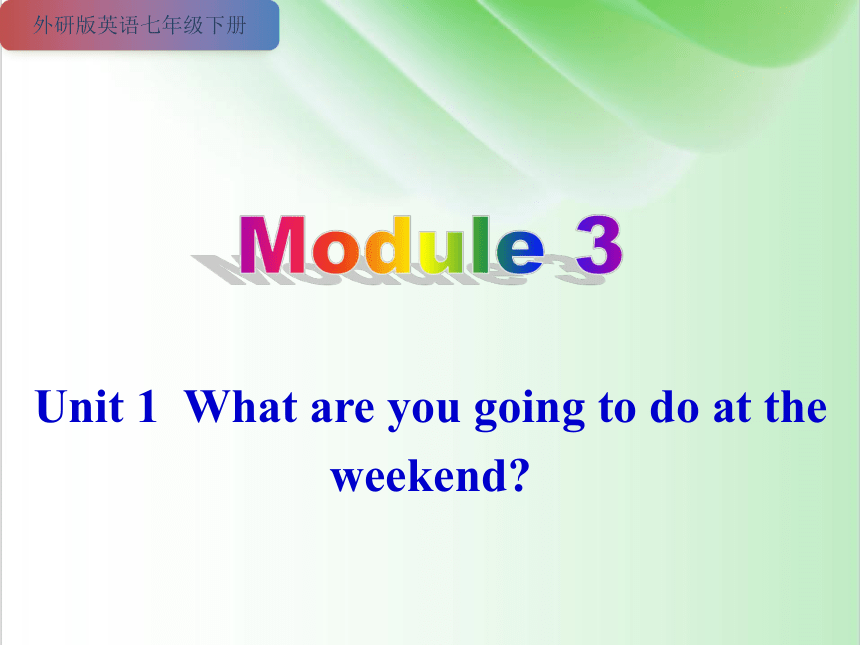
|
|
| 格式 | pptx | ||
| 文件大小 | 11.0MB | ||
| 资源类型 | 试卷 | ||
| 版本资源 | 外研版 | ||
| 科目 | 英语 | ||
| 更新时间 | 2024-03-04 17:07:32 | ||
图片预览

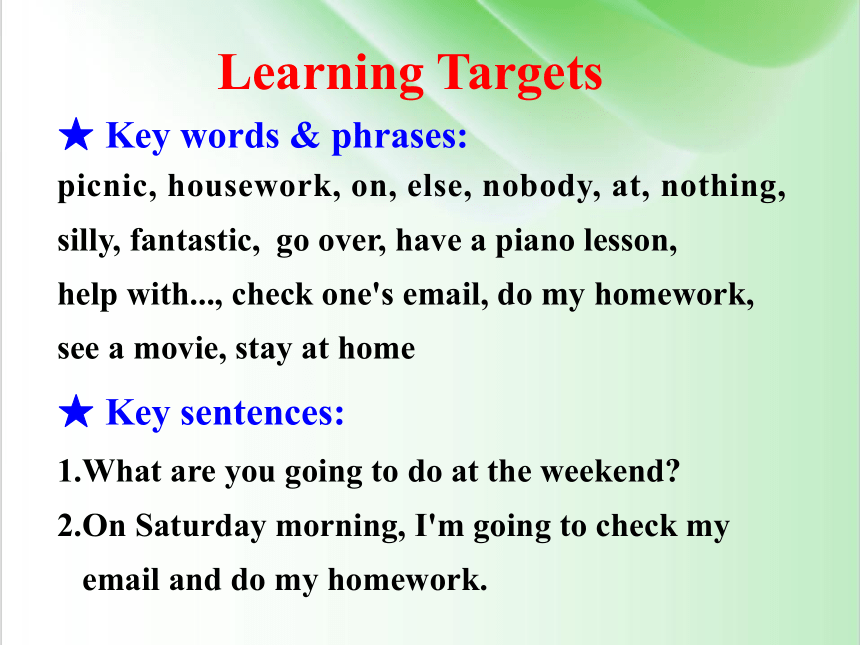
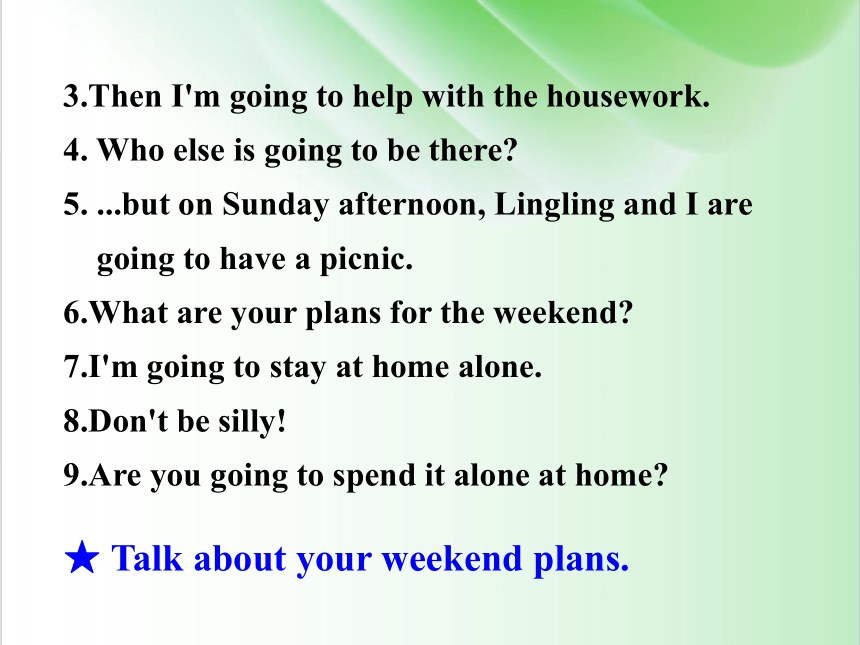
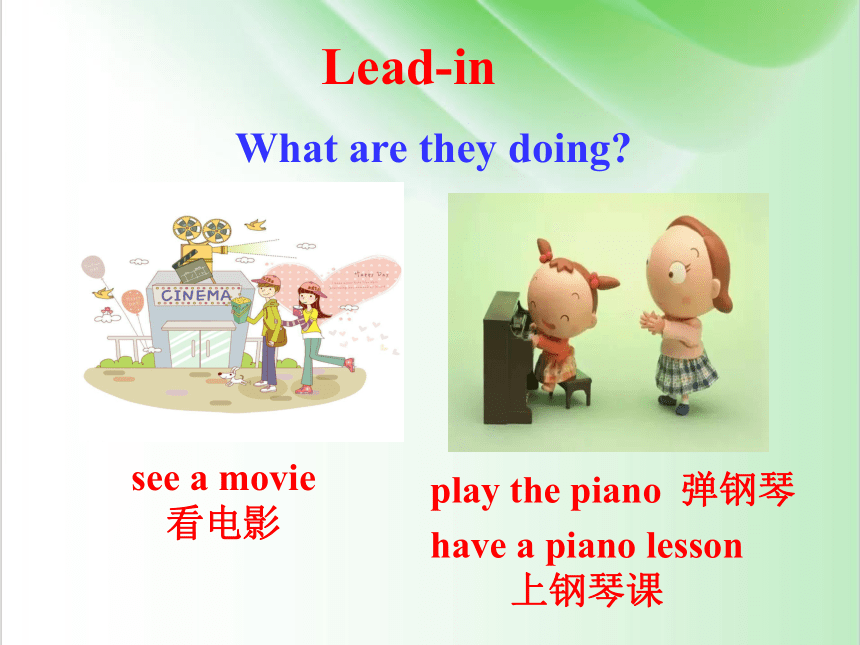


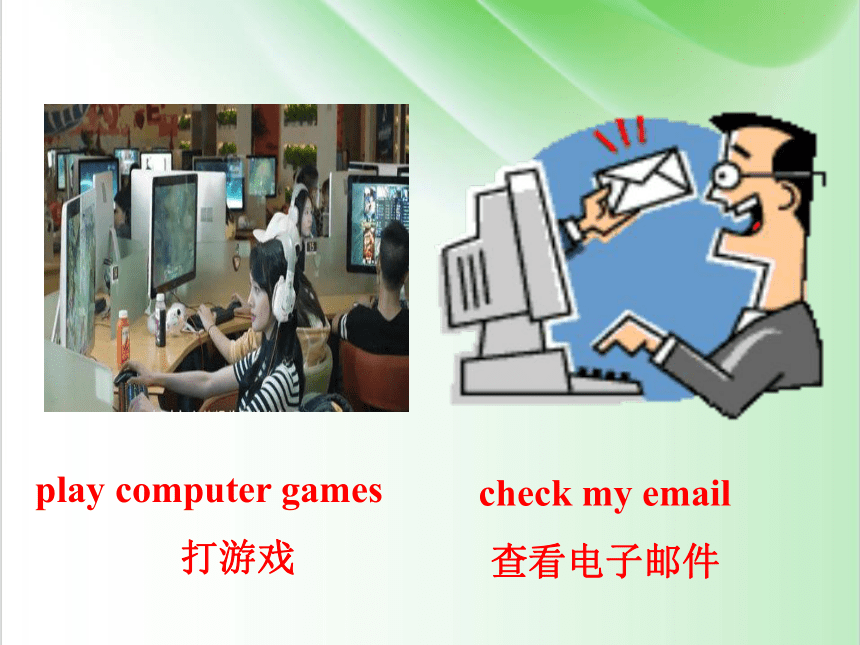
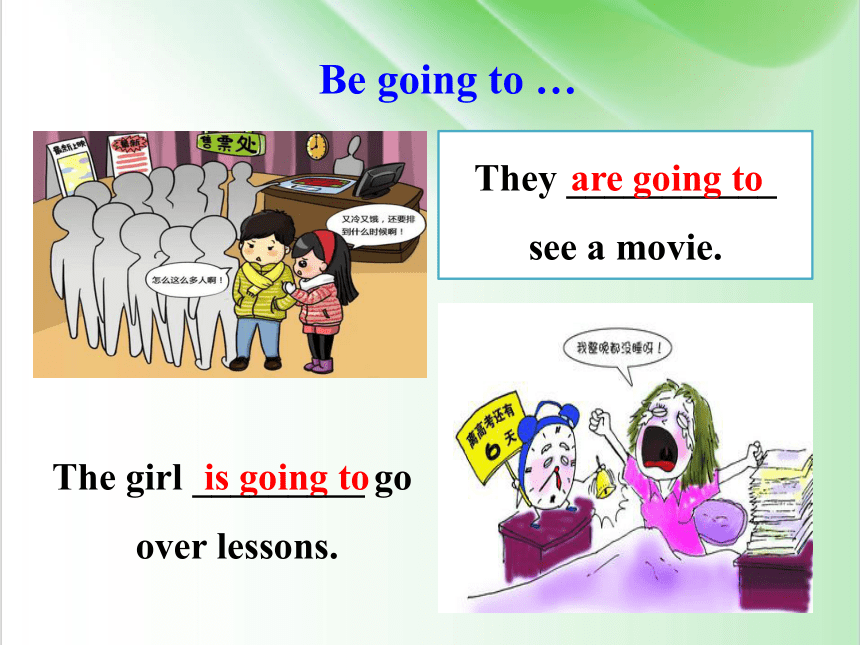
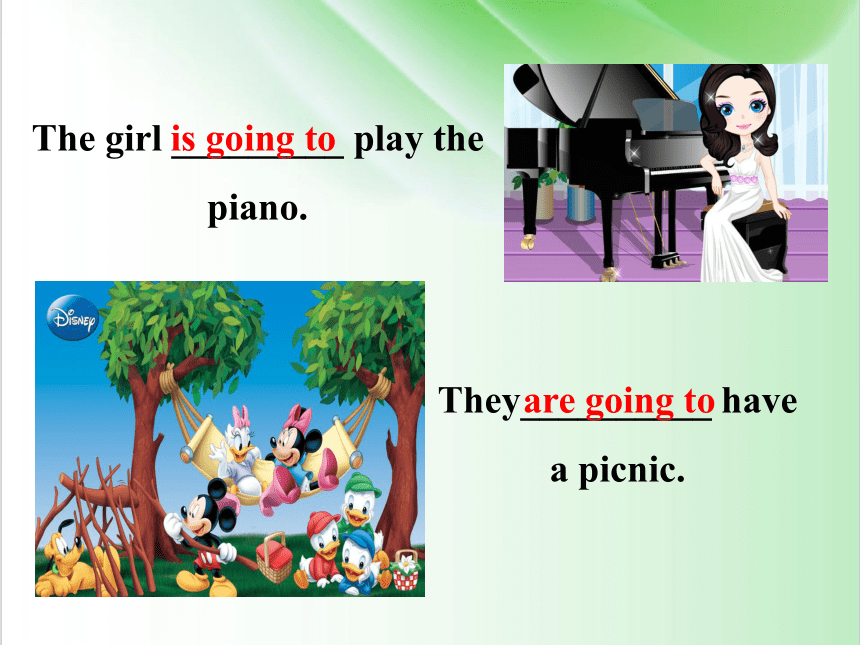
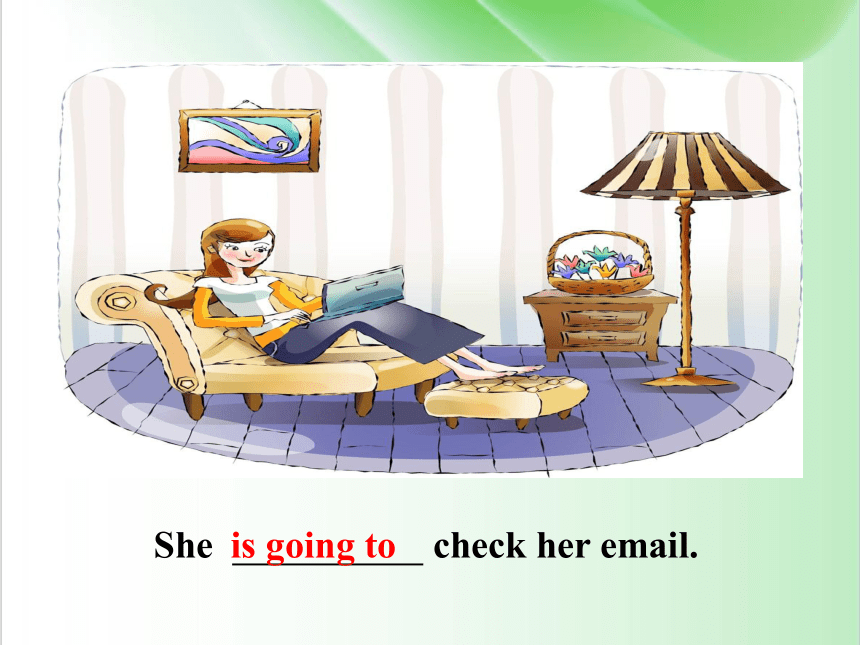
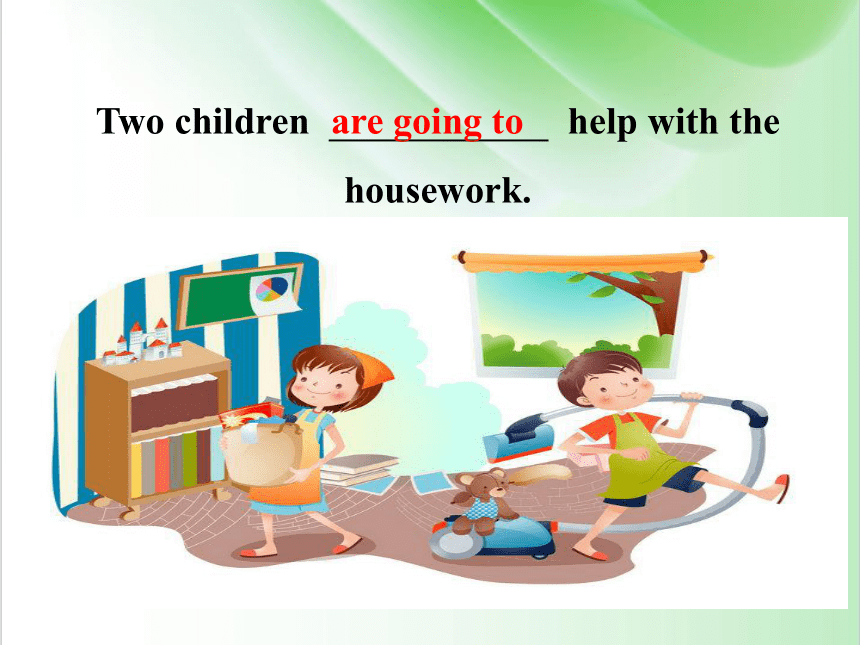
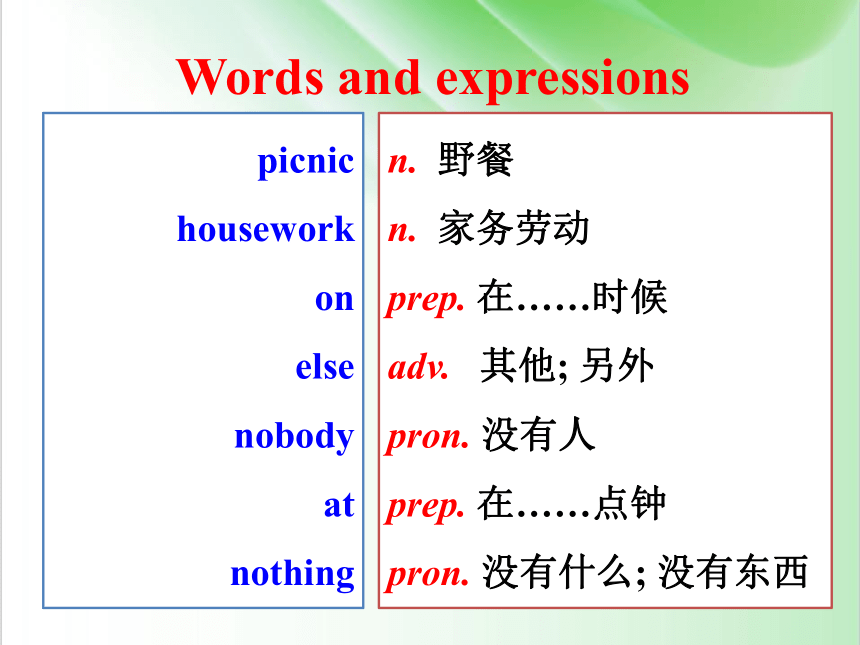
文档简介
(共121张PPT)
Module 3
外研版英语七年级下册
Unit 1 What are you going to do at the weekend
★ Key words & phrases:
picnic, housework, on, else, nobody, at, nothing, silly, fantastic, go over, have a piano lesson,
help with..., check one's email, do my homework,
see a movie, stay at home
★ Key sentences:
1.What are you going to do at the weekend
2.On Saturday morning, I'm going to check my
email and do my homework.
Learning Targets
3.Then I'm going to help with the housework.
4. Who else is going to be there
5. ...but on Sunday afternoon, Lingling and I are
going to have a picnic.
6.What are your plans for the weekend
7.I'm going to stay at home alone.
8.Don't be silly!
9.Are you going to spend it alone at home
★ Talk about your weekend plans.
Lead-in
What are they doing
see a movie
看电影
have a piano lesson
上钢琴课
play the piano 弹钢琴
stay at home
待在家
help with
the housework
帮忙做家务
go over lessons
复习功课
have a picnic
野餐
play computer games
打游戏
check my email
查看电子邮件
Look and Say
Be going to …
They ___________ see a movie.
are going to
is going to
The girl _________ go
over lessons.
The girl _________ play the piano.
is going to
They__________ have a picnic.
are going to
She check her email.
is going to
Two children help with the housework.
are going to
Words and expressions
picnic
housework
on
else
nobody
at
nothing
n. 野餐
n. 家务劳动
prep. 在……时候
adv. 其他; 另外
pron. 没有人
prep. 在……点钟
pron. 没有什么; 没有东西
silly
fantastic
adj. 愚蠢的; 傻气的
adj. 极好的
复习; 练习
查看某人的邮件
帮忙做……
上钢琴课
做家庭作业
看电影
待在家
go over
check one’s email
help with...
have a piano lesson
do one’s homework
see a movie
stay at home
Listening and vocabulary
1 Listen and match the words and
expression from Box A with the
word and expressions from Box B.
A check go over have see help have
B a movie a piano lesson a picnic lessons my email
with the housework
2
Match the expressions in Activity 1 with the pictures.
①
②
③
④
⑤
⑥
__________ _________________ ______
__________ ______________ __________
go over lessons
help with the housework
see a movie
check my email
have a piano lesson
have a picnic
listen and read
Everyday English
Would you like to join us
Don’t be silly!
Time Plans for the weekend Betty Daming
Saturday morning check the email
do one’s homework
help with the housework
√
√
√
×
×
×
Check(√) the plans about Betty and Daming.
Saturday afternoon see a movie
have a piano lesson
Sunday afternoon have a picnic
√
√
×
×
√
√
Time Plans for the weekend Betty Daming
Now answer the questions.
1.What’s Daming going to do on Saturday
morning
2. What’s Betty going to do on Saturday afternoon
3. Who is going to have a piano lesson on Saturday
4. Where are they going to meet
He’s going to check his email , do his homework and help with the housework.
She’s going to see a movie.
Lingling.
In the park.
4 Complete the conversation with the correct
form of the words from the box.
alone else fantastic nothing silly
Betty: What are your plans for next weekend,
Lingling
Lingling: (1)________. I don’t have any plans.
Betty: Are you going to spend it (2)_____ at home
Nothing
alone
Lingling: Well, …what are you going to do
Betty: Tony and I are going to have a picnic in the
park. We’re going to have a (3)________ time.
Are you going to come
Lingling: I’m not sure.
Betty: Don’t be (4)_____! What (5)____ are you going
to do
fantastic
silly
else
5 Listen and repeat.
/ai/ hi I like time
/ / picnic with
/i:/ police
/ai / my
Pronunciation and speaking
Pair work
6 Work in pairs. Ask and answer questions
about your plans at the weekend .
What are you going to do on Saturday morning
I'm going to check my email and do my homework.
You Your partner
Saturday morning ·check email ·do homework
afternoon
evening
Sunday morning
afternoon
evening
Li Wei
Saturday morning fly a kite
afternoon buy some clothes
evening go to a party
Sunday morning go over lessons
afternoon have a picnic
evening watch TV
Write about Li Wei’s plans for the weekend.
On Saturday morning , Li Wei is going to …
A: Hi! What is Li Lei going to do at the weekend
B: On Saturday morning , he is going to …
In the afternoon, he is going to …
In the evening , he is going to …
A: What about Sunday
B : On Sunday morning, he is going to …
In the afternoon, he is going to … with me.
And you’re going to come , too !
A : Am I Great !
Make a dialogue
Write a passage
Li wei would like to talk about his plans at the weekend.
He is going to do many things on Saturday. First
of all, he is going to fly a kite in the morning. In the afternoon, he is going to buy some new clothes on sale with his mother. Then, in the evening they are going to
a party and eat a lot of delicious food.
On Sunday morning, he is going to stay at home to go over his lessons. In the afternoon, he is going to have a picnic. Finally in the evening he plans to watch TV for fun.
He thinks it’s going to be a fantastic weekend. Do you think so
1. On Saturday morning, I’m going to check my
email and do my homework.
Language points
on Saturday morning 意为“在星期六早上”。
on 在此处用作介词,意为“在……时候”。
例:On Mother's Day,we should send flowers to our mother. 在母亲节那天,我们应该送花给我们的母亲。
I always watch TV on Friday. 星期五我通常看电视。
【辨析】on、in与at
(1) on ①表示在具体的某一天,如日期、生日、节日或星期几等。例:on Monday 在星期一;on Teachers' Day在教师节。②表示在具体某一天的上午/下午/晚上。例:I was born on the morning of July 2nd. 我生于7月2号早晨。
(2) in ①表示在较长的一段时间内,如周、月份、
季节、年份、世纪等。例:in May 在五月;in spring在春天;in the 1990s 在20世纪90年代。
in ②用于某些固定搭配。
例:She does her homework in the morning/afternoon
/evening. 她在早上/下午/晚上做家庭作业。
(3) at
①表示具体的时间点。
例:Mother gets up at eight o'clock today. 我的妈妈今天8点钟起床。
②用于某些固定搭配。
例:The boy wants to play games at night. 这个男孩想在晚上玩游戏。
1. —When did your uncle arrive ______ China
—He got to Guangzhou _______the morning of the
16th of April. (广东广州中考)
A. at; in B. in; in C. to; on D. in; on
2.—When did the fire take place
—It took place __________ Sunday morning.
(广东湛江中考)
A.on B.at C.in D.of
中考链接
help with sth. 意为“帮忙做某事”。help sb. with sth. 意为“帮助某人做某事”,相当于help sb. (to) do sth.,该结构中的动词不定式符号可省略。
例:I often help my mother with housework=I often help my mother (to) do housework.
我经常帮助妈妈做家务。
Could you help me with my English
你能帮助我学英语吗?
2. Then I’m going to help with the housework.
1. We should ______our parents do some housework
at home.
help
2. I’m going to help my mom ______ the housework.
3. I often help him ______ his maths.
4. I helped her ____________________ (look for) her
wallet on the bus.
【学以致用】
with
with
to look for / look for
3. ...but on Sunday afternoon, Lingling and I are going
to have a picnic.
have a picnic 去野餐。它是固定短语,结构为:have+名词 (短语)。类似的短语还有:have a look 看一看;have a lesson/class 上课;have a speech 做演讲;have a rest 休息一会儿;have breakfast / lunch / supper 吃早饭/午饭/晚饭。
例:We are having a picnic by the lake. Have a look at that bird! 我们正在湖边野餐。 看那只鸟!
Today is Sunday. It's sunny. Would you like to have a ________ in the park with us
【学以致用】
picnic
4. What are your plans for the weekend?
plan在此处用作可数名词,意为“计划”。短语:① plan for... 意为“对于……的计划”。
例:Do you have plans for tonight,Linda?
琳达,你今晚有什么计划吗?
② make a plan for... 意为“为……制定计划”,其后可接名词、代词或现在分词。
例:We make a plan for our summer vacation this year. 我们为今年的暑假制定计划。
5. I’m going to stay at home alone.
alone 在此处用作副词,意为“单独地,独自地”。用于表述客观情况或事实,无情感色彩,相当于
on one's own / by oneself。
例:He is going there alone/on his own/by himself.
他打算独自去那儿。
【拓展】① alone作副词 还可用于名词或代词之后,表示“仅仅,只有”。例:She alone decided not to go there.只有她一个人决定不去那儿。② alone 作形容词,意为“单独的”,只作表语,不作定语。
例:You are not alone. I am with you. 你并不是孤身一人。我与你同在。
链接 lonely作形容词,可表示情感上是“寂寞的,孤独的”,既可作表语也可作定语。还可意为“荒凉的,偏僻的”,只能作定语。
例:I feel lonely without you. 没有你,我感觉孤独。He lived in a lonely place. There is no house around.
他住在一个偏僻的地方。周围没有其他房屋。
一般将来时:
用法:be going to +动词原形表示计划做某事或者有意做某事。
例:She is going to check his email tonight.
她打算今晚查看一下她的电子邮件。
2. 结构:be(are/am/is)+ going to + 动词原形
例:We are going to have a picnic on Saturday.
我们周六要去野餐。
Grammar
3. 时间状语:tomorrow(明天), this weekend
(本周), next year(明年)/month(下个月)
/season(下一季)/term(下学期), one day (将来
的一天), tonight (今晚)以及还没到来的时间等。
例:He is going to write a letter tonight.
他打算今晚写一封信。
He will write a book one day. 他将来会
写一本书。
She is going to lend us her book. 她打算借书给我们。
句型转换:
肯定句:He is going to get up early on Saturday
morning.
否定句:
疑问句:
回答:
He isn’t going to get up early on Saturday
morning.
Is he going to get up early on Saturday
morning
Yes, he is / No, he isn’t.
1.肯定句: 主语+ be going to +动词原形
(1) 我打算在早上查看一下电子邮件。
I _______________ my email in the morning.
(2) 他打算在周末去野餐。
He ______________________ at the weekend.
am going to check
is going to have a picnic
2. 否定句:主语+ be not going to +动词原形,表示
某人不打算做某事
我们不打算在星期六开晚会。
We _________________________ on Saturday.
3. 一般疑问句: Be +主语 + going to +动词原形?
回答: Yes, 主语 + be. / No, 主语+ be not.
“你打算在下午做作业吗?” “ 是的。”
— ____ you ________________homework in the
afternoon —Yes , I _______.
aren’t going to have a party
Are going to do your
am
4. 特殊疑问句:
特殊疑问词+ be +主语+going to +动词原形?
(1) 他打算在周末做什么?
What ____he ____________ at the weekend
(2) 他们打算什么时候打扫房间?
When ____ they _____________ the room
(3) 你为什么打算呆在家里
Why ____ you ______________ at home
is going to do
are going to clean
are going to stay
Summary
1. some useful words and expressions: picnic, housework, on, else, nobody, at, nothing, silly, fantastic, go over, have a piano lesson, help with..., check my email, do my homework, see a movie, stay at home
2. 一般将来时:be going to 的用法
Module 3
外研版英语七年级下册
Unit 2 We're going to cheer the players.
lrning
★ Key words & phrases:
forward, fan, shirt, cheer, player, hope, win, myself, during, May, late, walk, country, second, collect, litter, fun, camp, Australian, sightseeing, beach, look forward to, make friends, enjoy oneself, May Day, take a walk, collect litter, summer holiday, go on a summer camp, go sightseeing
★ Key sentences:
1. I’m looking forward to the football match tomorrow.
Learning Targets
2.We're all going to wear the team shirt, and we're
going to cheer the players.
3.I hope they win the match!
4.I'm going to enjoy myself during the May Day holiday.
5.Usually I spend the summer holiday at home, but this
year is going to be very different because I'm going
on a summer camp in Sydney, Australia.
★ Learn to make some plans for your holiday
and talk about your reasons.
Words and expressions
forward
fan
shirt
cheer
player
hope
win
myself
during
adv. 面向未来的;向前
n. 迷;支持者
n. 球衣;(男式)衬衫
v. 为……喝彩
n. 运动员;选手
v. 希望
v. 赢;获胜
pron. 我自己
prep. 在……期间
May
late
walk
country
second
collect
litter
fun
camp
Australian
n. 5月
adv. 迟;晚 adj. 迟的;晚的
n. 步行;走
n. 乡下;乡村
num. 第二
v. 收集
n. 垃圾
n. 娱乐;乐趣
n. 营地;帐篷
adj. 澳大利亚的
sightseeing
beach
look forward to
make friends
enjoy oneself
May Day
take a walk
collect litter
summer holiday
go on a summer camp
go sightseeing
n. 观光;游览
n. 沙滨;海滩
盼望
交朋友
过得愉快
五一劳动节
散步
收集垃圾
暑假
参加夏令营
观光
Warming up
—What are you going to do at the weekend
—I/She/He/It/They am/is/are going to…
swim
cook
check the email
draw a picture
play computer
games
am/is/are going to
go to the park
go over lessons
watch TV
am/is/are going to
am/is/are going to
play table tennis
help with the housework
help the kid with his lessons
Cheer the players
look forward to a trip
enjoy oneself
take a walk
collect litter
go sightseeing
1. Read the passage and match the people
with the pictures.
Presentation
A I'm looking forward to the football
match tomorrow. My friends and I
are going to watch our favorite team.
We're going to meet other fans, and
make some new friends. We're all
going to wear the team shirt, and
we're going to cheer the players. I
hope they win the match!
——Martin
What are you going to do
B I’m going to enjoy myself during the
May Day holiday. On the morning
of 1st May, I’m going to get up late
and then read a book. In the
afternoon I’m going out with my
family and friends. We’re going to
take a walk in the country or go
swimming. And on 2nd May we’re
going to collect litter in the park near
my friend’s house. It’s going to be a great holiday—
busy but good fun!
—— Zhang Sijia
C Usually I spend the summer holiday at home,
but this year is going to be very different
because I’m going on a summer camp in
Sydney Australia. I’m going to stay with an
Australian family and speak English. We’re
also going sightseeing and going to have a
picnic on the beach.
—Lucy
Everyday English
When a passage has pictures ,
the pictures often contain some
important information. So look
at the pictures before you read,
as this will make the passage
easier to understand.
Learning to learn
Martin Zhang Sijia Lucy
watch a football match
spend time with family and friends
go on a summer camp
collect litter
stay with an Australian family
meet other football fans
2 check(√) what they’re going to do.
√
√
√
√
√
√
3 Work in pairs. Ask and answer the questions.
When is Martin going to watch a football match
What does Martin hope
Why is it going to be a busy holiday for Zhang Sijia
Tomorrow.
He hopes his team will win the match.
Because she’s going to do a lot of things during the holiday.
4. Why is this summer holiday going to be different
for Lucy
Because usually she spends the summer holiday at home, but this year she’s going on a summer camp in Sydney, Australia.
5. Who is Lucy going to stay with
She’s going to stay with an Australia
family.
4 Complete the passage with the correct form
of the words from the box.
Martin and his friends are going to watch their favorite football team play and (1) __________ the
(2) ___________.
cheer
players
Australian beach camp cheer collect during forward fun hope litter player sightseeing swimming win
It’s going to be great (3) ___ and they (4) ____ their team gets the best score and (5) ____ the match.
Zhang Sijia is going to do something with her family and friends on May Day. They’re going to take a walk or go (6) _________. There’s a lot of (7) ______ in the park, and on 2nd May, they’re going to (8) ______ it.
fun
hope
win
swimming
litter
collect
During
camp
Australian
beach
sightseeing
forward
(9) _______ her summer holiday, Lucy is going to a summer (10) _____ and is going to stay with a(n)
(11) __________ family. They’re going to the
(12) _______ and are going (13) ____________. She’s really looking (14) _________ to her holiday in Australia.
1. I'm looking forward to the football match tomorrow.
look forward to 意为“盼望,期待”,该结构中的
to是介词,后接名词、代词或动词 ing形式。
例:◆I’m looking forward to the football match tomorrow. I hope our team win the match.
我期盼着明天的足球比赛。我希望我们队赢。
◆They are looking forward to visiting Beijing this summer. 他们期待着今年夏天去参观北京。
Language points
【学以致用】
① He is looking forward to________ out on Sunday.
A. go B. going C. going to D. go for
②我们盼望能有一辆新车。
We _________________ having a new car.
③ He is ___________________ ________
with the new Prime Minister.
look forward to
looking forward to
working
2. We're all going to wear the team shirt, and we're
going to cheer the players.
(1) wear意为“穿着,戴着”,表示状态。其过去式
和过去分词分别为wore和worn。
wear用于一般现在时,表示经常的状态;用于进行时表示暂时的情况。
例:She often wears skirts but today she is wearing a pair of trousers. 她经常穿裙子,但今天穿了一条裤子。
What will you wear tomorrow 你明天穿什么?
wear 表示状态,多用于一般现在时和现在进行时。 He always wears glasses.
他总是戴着眼镜。
dress 强调动作,dress sb. 意为“给某人穿衣服”;dress oneself意为“自己穿衣服”。 She is dressing the baby. 她正在给那个婴儿穿衣服。
put on 表示动作,其后接衣服、鞋帽等名词,不能与一段时间连用。 He put on his coat and went to work. 他穿上外套去上班了。
in 表示状态,其后常接颜色或服饰类的名词。 The girl in red is my sister. 那个穿红衣服的女孩是我的妹妹。
辨析 wear、dress、put on 与 in
(2) cheer在此处用作及物动词,意为“为……喝彩”。cheer up 意为“使振奋”,是“动词+副词”结构的短语,接名词时,名词放在up的前后皆可;接代词时,代词只能放在cheer和up之间。
例:My English teacher tried her best to cheer me up whenever I failed.
无论我何时失败,我的英语老师都尽力让我振作起来。
She tried to cheer up the disappointed child but failed.
她努力想让这个沮丧的孩子开心起来,但失败了。
3. I hope they win the match!
(1) hope在此处用作动词,意为“希望”。 hope引导的从句常用一般现在时表将来。
例:I hope she likes the flowers.我希望她喜欢这些花。
【探究总结】
hope用法:
① hope to do sth. 意为“希望做某事”;
② hope后接that从句,that可省略,意为“希望……”;
③ I hope so. 我希望如此。I hope not. 我不希望如此。
【学以致用】
①我们希望不久能见到你。
We _______________you soon.
② “明天会下雨吗?”
“我希望不下雨。”
—Is it going to rain tomorrow
—I ________ ________ .
③我希望你能帮我。
I ________ you ________ help me.
hope to see
hope not
hope
can/will
(2) win v. 赢,获胜
◆I hope they win the match. 我希望他们能赢比赛。
◆She loves to win an argument.她喜欢在辩论中获胜。
【探究总结】
win 的用法:
(1)win v. 后接奖品或比赛,不能接某人。其名词形式为winner,意为“获胜者”。
例:Who was the winner 谁是获胜者?
He wins the match, so he is the winner. 他赢了比赛,所以他是赢家。
(2) beat/win的用法辨析。
【图解助记】 “打败”和“赢”
beat sb.
(in the match)
(比赛中) 赢了某人
win the match
赢了比赛
【学以致用】
① The__________ (win) is going to England next month.
② I hope Betty ________________________ (win) the
first place.
③ They are trying to ________ (win) support for their
new
plan.
winner
will win/is going to win
win
4. Usually I spend the summer holiday at home, but
this year is going to be very different because I'm
going on a summer camp in Sydney, Australia.
(1)这是由but引导的表转折的并列句,在后一分句中,含有一个由because引导的原因状语从句“I'm going ... Australia”。because 引导的从句常用来说明直接的原因。
例:Because it was raining, we stayed at home. 因为天在下雨,所以我们待在家了。
4. Usually I spend the summer holiday at home, but
this year is going to be very different because I'm
going on a summer camp in Sydney, Australia.
(2) go on a summer camp 参加夏令营。
“go on + 名词短语”常表示“去做……”。
类似的短语有:go on a picnic去野餐;go on a holiday去度假。
例: Nobody in his family is going to go on a trip in a foreign country. 他家没人打算去国外旅行。
5 Look at the question and answer.
— Why is Martin looking forward to tomorrow
— Martin is looking forward to tomorrow because
he and his friends are going to watch their
favorite team play football.
Writing
Now write answers to the question.
Use because.
Why is Zhang sijia going to a park near her friend’s house
Zhang sijia is going to a park near her
friend’s house because there is a lot of litter
in the park and they’re going to collect it.
2. Why is this summer holiday going to be very
different for Lucy
This summer holiday is going to be very different
for Lucy because usually she spend the summer holiday at home , but this year she’s going on a summer camp in Sydney, Australia
6 Work in pairs. Ask and answer the question.
What are you looking forward to this weekend
What are you going to do
Why are you going to do it
Pair work
Report like this:
Betty is looking forward to going out on
Saturday evening. She’s going to go to the
cinema because she likes films.
Now write about your partner.
... is going to see a movie on Saturday evening. He/she is looking forward to it because he/she likes the actors in it.
Summary
1. We learned some useful words and
expressions: forward, fan, shirt, cheer,
player, hope, win, myself, collect litter,
summer holiday, go on a summer camp,
go sightseeing…
2. Learn to make some plans for your
holiday and express why you’re going to
do that.
Module 3
外研版英语七年级下册
Unit 3 Language in use
★ Key words & phrases:
early, listen to music, play computer games, get up, stay in bed, do some sports
★ Key sentences:
1.In the afternoon they sometimes go for a walk.
2.But on Sunday evening, it's time for homework!
★ Review the words and phrases and the usage of
“be going to”.
Learning Targets
What is he / she going to do
He is going to
have a picnic.
He’s going to
stay in bed.
Warming up
She is going to do
her homework.
He is going to
the theatre.
What is he / she going to do
Language practice
I’m going to check my email.
Lingling and I are going to have a picnic.
Lingling is going to have a piano lesson.
What are you going to do at the weekend
Are we going to meet here
No, we aren’t.
be going to + v.原形
Grammar structure: 一般将来时
一、用法:表达打算,计划,有意做某事.
二、形式: Subject + be going to + v.(原型)
肯定句:
I am going to visit Australia.
She is going to buy some clothes.
They are going to play games.
1. 一般将来时表示某人打算或准备做的事情或即将
发生的事。例:
be going to的用法
今天下午爸爸和我打算去看京剧。
Dad and I are going to see a Beijing opera this afternoon.
今天我们要开会。
We are going to have a meeting today.
2. 有迹象要发生的事
明天将会是个好天气。
It’s going to be a fine day tomorrow.
看天空,马上要天晴了。
Look at the sky, it is going to be sunny.
我认为天快下雪了。
I think it’s going to snow soon.
看看这些乌云,将要下雨了。
Look at the dark clouds;it is going to rain.
3. 有些位置移到的动词可以用进行时表示将要发生
的动作。如: come, go, leave, stay,arrive 等。
公共汽车就要来了,赶快!
The bus is coming. Hurry up!
他们今天晚上离开上海。
They are leaving Shanghai this evening.
列车马上到达了,请注意。
The train is arriving. Attention please.
4. 表示“某地/某时将有……”时,可以把 there be句型与 be going to 连用,即: There is/are going to be ...
例:There is going to be a concert on Friday evening. 周五晚上将有一场音乐会。
There is going to be a basketball match this afternoon. 今天下午将有一场篮球比赛。
There are going to be several football matches in the next few days.
接下来几天,将会有好几场足球赛。
be going to 中的be动词要随着句子
主语的人称或数的变化而变化。
I’m going to the park. 我打算去公园。
What are they going to do 他们打算做什么?
He’s going to buy a new watch. 他打算买一个新的手表。
be going to的主谓变化
What is she going to do 她打算做什么?
Be (Am/Is/Are)+主语+going to+动词原形+其他?
肯定回答:Yes,主语(人称代词)+be(am/is/are).
否定回答:No,主语(人称代词)+be(am/is/are)+not.例:—Is Mary going to listen to music?
玛丽打算听音乐吗?
—Yes, she is. /No, she isn't.
是的,她打算听音乐。/不,她不打算听音乐。
一般将来时的一般疑问形式
主语+be (am/ is/ are)+not+going to+动词原形
+其他。
He is going to swim tomorrow. 他明天打算去游泳。
(改为否定句)
____________________________________________
一般将来时的否定形式
He is not =(isn’t) going to swim tomorrow.
他明天不打算去游泳。
把下面几个句子改成否定句:
I am going to fly kites this afternoon.
We are going to play computer games tonight.
He is going to make a model plane tomorrow.
I am not going to fly kites this afternoon.
We aren’t going to play computer games tonight.
He isn’t going to make a model plane tomorrow.
1. 问人 Who…
例:I’m going to New York soon.
→Who’s going to New York soon 谁不久要去纽约?
2. 问做什么 What … do
例:My father is going to watch a race with me this
afternoon.
→What is your father going to do with you this
afternoon 你和你父亲今天下午打算做什么?
be going to的特殊疑问形式
3. 问什么时候 When…
例:She’s going to go to bed at nine.
→When is she going to bed 她什么时候上床睡觉?
4. 同义句: be going to = will
例:I am going to go swimming tomorrow.
= I will go swimming tomorrow. 我明天要去游泳。
在一般将来时中,常常会有表示将来的时间状语,
如: tomorrow、tomorrow morning/afternoon、
next year/week 等。
例:Anna is going to clean the refrigerator tomorrow afternoon. 安娜打算明天下午清理冰箱。
They are coming here this afternoon. 他们今天下午要来这儿.
What are you doing next Sunday 下个星期天你打算做什么
表示将来的时间状语
1 Work in pairs. Look at the table. Ask and
answer questions about weekend plans.
People you
your parents
your friends
Activity have a picnic
listen to music
play computer games
take a walk
—What are you going to do on Saturday morning
—On Saturday morning I’m going to…
We are going to _____ a movie this weekend.
They are going to______ football on Sunday.
3. Betty wants to go shopping. She’s going to ____
some clothes.
4. I’m going to _____ a piano lesson on Saturday
morning.
2 Complete the sentences with the correct
form of the words and expressions from
the box.
buy get up go have make play
see stay walk
see
play
buy
have
5. Daming isn’t going to ____ in bed on Sunday morning. He’s going to ______ early.
6. Lingling wants to go for a walk. She’s going
to ____ in the park.
7. Tony is going to ____ to a summer
camp during the summer
holiday. He’s going to
_____ a lot of friends
and have fun.
stay
get up
walk
go
make
3 Put the words in the correct order to make
questions.
1. check / you / going / are / to / email / your /
Are you going to check your email
2. they / on / in / park / are / going / to/ Sunday /
litter / collect / the /
3. some / going / is / new / buy / Betty / to / clothes
Are they going to collect the litter in the park
on Sunday
Is Betty going to buy some new clothes
4. this / a / you / see / going / are / to / movie / evening /
5. computer / Tony / to /play / a / is / going / game /
Are you going to see a movie this evening
Is Tony going to play a computer game
Now complete the answers to the questions.
Use shprt forms.
— Are you going to check your
email
— yes, I _____.
2. —Are they going to collect
litter in the park on Sunday
—Yes, they ______.
am
are
1.Yes, I ______.
2.Yes, they ____
3._____, she isn’t.
4. No, we ________.
5.Yes, he _____.
3. —Is Betty going to buy some new clothes
—_______, she isn’t
4. —Are you going to see a movie this evening
—No , we______.
5. —Is Tony going to play a computer game
—yes, he ____.
No
aren’t
is
Around the world
Weekend plans
At the weekend , many young people in the UK do some sports on Saturday morning, and may be go shopping in that afternoon. On Sunday they get up
late, see friends and have lunch with their family. In the afternoon they sometimes go for a walk. But on Sunday evening, it’s time for homework.
Saturday
morning
Saturday
afternoon
Sunday
morning
Sunday
afternoon
Sunday
evening
do some sports
go shopping
get up late, see friends and
have lunch with their family
go for a walk
do their homework
People in the UK
Talking about your weekend plans
Module task
4 Work in group of three. Talk about
what you are going to do at the weekend
For example:
A: What you are going to do at the weekend
B: I’m going to… (to C) What about you
C: I’m going to…
Now write down your iseas.
5 Make plans to do things together with
the others in your group. Make a group
diary for next weekend.
Saturday
morning
Saturday
afternoon
Saturday
evening
Sunday
morning
Sunday
afternoon
Sunday
evening
6 Talk about your group diary to the whole
class.
On ... we are going to...
We are going to play... on...
We are going to... on...
Summary
be going to, 跟“动原”, 计划、准备
或打算; 表可能,有必然,通过现象来
判断。be 的形式要注意,它要随着人
称变; 否定句,很简单,not 加在 be 后
面; 疑问句,需牢记,be 应提到主语前。
谢谢观看
Module 3
外研版英语七年级下册
Unit 1 What are you going to do at the weekend
★ Key words & phrases:
picnic, housework, on, else, nobody, at, nothing, silly, fantastic, go over, have a piano lesson,
help with..., check one's email, do my homework,
see a movie, stay at home
★ Key sentences:
1.What are you going to do at the weekend
2.On Saturday morning, I'm going to check my
email and do my homework.
Learning Targets
3.Then I'm going to help with the housework.
4. Who else is going to be there
5. ...but on Sunday afternoon, Lingling and I are
going to have a picnic.
6.What are your plans for the weekend
7.I'm going to stay at home alone.
8.Don't be silly!
9.Are you going to spend it alone at home
★ Talk about your weekend plans.
Lead-in
What are they doing
see a movie
看电影
have a piano lesson
上钢琴课
play the piano 弹钢琴
stay at home
待在家
help with
the housework
帮忙做家务
go over lessons
复习功课
have a picnic
野餐
play computer games
打游戏
check my email
查看电子邮件
Look and Say
Be going to …
They ___________ see a movie.
are going to
is going to
The girl _________ go
over lessons.
The girl _________ play the piano.
is going to
They__________ have a picnic.
are going to
She check her email.
is going to
Two children help with the housework.
are going to
Words and expressions
picnic
housework
on
else
nobody
at
nothing
n. 野餐
n. 家务劳动
prep. 在……时候
adv. 其他; 另外
pron. 没有人
prep. 在……点钟
pron. 没有什么; 没有东西
silly
fantastic
adj. 愚蠢的; 傻气的
adj. 极好的
复习; 练习
查看某人的邮件
帮忙做……
上钢琴课
做家庭作业
看电影
待在家
go over
check one’s email
help with...
have a piano lesson
do one’s homework
see a movie
stay at home
Listening and vocabulary
1 Listen and match the words and
expression from Box A with the
word and expressions from Box B.
A check go over have see help have
B a movie a piano lesson a picnic lessons my email
with the housework
2
Match the expressions in Activity 1 with the pictures.
①
②
③
④
⑤
⑥
__________ _________________ ______
__________ ______________ __________
go over lessons
help with the housework
see a movie
check my email
have a piano lesson
have a picnic
listen and read
Everyday English
Would you like to join us
Don’t be silly!
Time Plans for the weekend Betty Daming
Saturday morning check the email
do one’s homework
help with the housework
√
√
√
×
×
×
Check(√) the plans about Betty and Daming.
Saturday afternoon see a movie
have a piano lesson
Sunday afternoon have a picnic
√
√
×
×
√
√
Time Plans for the weekend Betty Daming
Now answer the questions.
1.What’s Daming going to do on Saturday
morning
2. What’s Betty going to do on Saturday afternoon
3. Who is going to have a piano lesson on Saturday
4. Where are they going to meet
He’s going to check his email , do his homework and help with the housework.
She’s going to see a movie.
Lingling.
In the park.
4 Complete the conversation with the correct
form of the words from the box.
alone else fantastic nothing silly
Betty: What are your plans for next weekend,
Lingling
Lingling: (1)________. I don’t have any plans.
Betty: Are you going to spend it (2)_____ at home
Nothing
alone
Lingling: Well, …what are you going to do
Betty: Tony and I are going to have a picnic in the
park. We’re going to have a (3)________ time.
Are you going to come
Lingling: I’m not sure.
Betty: Don’t be (4)_____! What (5)____ are you going
to do
fantastic
silly
else
5 Listen and repeat.
/ai/ hi I like time
/ / picnic with
/i:/ police
/ai / my
Pronunciation and speaking
Pair work
6 Work in pairs. Ask and answer questions
about your plans at the weekend .
What are you going to do on Saturday morning
I'm going to check my email and do my homework.
You Your partner
Saturday morning ·check email ·do homework
afternoon
evening
Sunday morning
afternoon
evening
Li Wei
Saturday morning fly a kite
afternoon buy some clothes
evening go to a party
Sunday morning go over lessons
afternoon have a picnic
evening watch TV
Write about Li Wei’s plans for the weekend.
On Saturday morning , Li Wei is going to …
A: Hi! What is Li Lei going to do at the weekend
B: On Saturday morning , he is going to …
In the afternoon, he is going to …
In the evening , he is going to …
A: What about Sunday
B : On Sunday morning, he is going to …
In the afternoon, he is going to … with me.
And you’re going to come , too !
A : Am I Great !
Make a dialogue
Write a passage
Li wei would like to talk about his plans at the weekend.
He is going to do many things on Saturday. First
of all, he is going to fly a kite in the morning. In the afternoon, he is going to buy some new clothes on sale with his mother. Then, in the evening they are going to
a party and eat a lot of delicious food.
On Sunday morning, he is going to stay at home to go over his lessons. In the afternoon, he is going to have a picnic. Finally in the evening he plans to watch TV for fun.
He thinks it’s going to be a fantastic weekend. Do you think so
1. On Saturday morning, I’m going to check my
email and do my homework.
Language points
on Saturday morning 意为“在星期六早上”。
on 在此处用作介词,意为“在……时候”。
例:On Mother's Day,we should send flowers to our mother. 在母亲节那天,我们应该送花给我们的母亲。
I always watch TV on Friday. 星期五我通常看电视。
【辨析】on、in与at
(1) on ①表示在具体的某一天,如日期、生日、节日或星期几等。例:on Monday 在星期一;on Teachers' Day在教师节。②表示在具体某一天的上午/下午/晚上。例:I was born on the morning of July 2nd. 我生于7月2号早晨。
(2) in ①表示在较长的一段时间内,如周、月份、
季节、年份、世纪等。例:in May 在五月;in spring在春天;in the 1990s 在20世纪90年代。
in ②用于某些固定搭配。
例:She does her homework in the morning/afternoon
/evening. 她在早上/下午/晚上做家庭作业。
(3) at
①表示具体的时间点。
例:Mother gets up at eight o'clock today. 我的妈妈今天8点钟起床。
②用于某些固定搭配。
例:The boy wants to play games at night. 这个男孩想在晚上玩游戏。
1. —When did your uncle arrive ______ China
—He got to Guangzhou _______the morning of the
16th of April. (广东广州中考)
A. at; in B. in; in C. to; on D. in; on
2.—When did the fire take place
—It took place __________ Sunday morning.
(广东湛江中考)
A.on B.at C.in D.of
中考链接
help with sth. 意为“帮忙做某事”。help sb. with sth. 意为“帮助某人做某事”,相当于help sb. (to) do sth.,该结构中的动词不定式符号可省略。
例:I often help my mother with housework=I often help my mother (to) do housework.
我经常帮助妈妈做家务。
Could you help me with my English
你能帮助我学英语吗?
2. Then I’m going to help with the housework.
1. We should ______our parents do some housework
at home.
help
2. I’m going to help my mom ______ the housework.
3. I often help him ______ his maths.
4. I helped her ____________________ (look for) her
wallet on the bus.
【学以致用】
with
with
to look for / look for
3. ...but on Sunday afternoon, Lingling and I are going
to have a picnic.
have a picnic 去野餐。它是固定短语,结构为:have+名词 (短语)。类似的短语还有:have a look 看一看;have a lesson/class 上课;have a speech 做演讲;have a rest 休息一会儿;have breakfast / lunch / supper 吃早饭/午饭/晚饭。
例:We are having a picnic by the lake. Have a look at that bird! 我们正在湖边野餐。 看那只鸟!
Today is Sunday. It's sunny. Would you like to have a ________ in the park with us
【学以致用】
picnic
4. What are your plans for the weekend?
plan在此处用作可数名词,意为“计划”。短语:① plan for... 意为“对于……的计划”。
例:Do you have plans for tonight,Linda?
琳达,你今晚有什么计划吗?
② make a plan for... 意为“为……制定计划”,其后可接名词、代词或现在分词。
例:We make a plan for our summer vacation this year. 我们为今年的暑假制定计划。
5. I’m going to stay at home alone.
alone 在此处用作副词,意为“单独地,独自地”。用于表述客观情况或事实,无情感色彩,相当于
on one's own / by oneself。
例:He is going there alone/on his own/by himself.
他打算独自去那儿。
【拓展】① alone作副词 还可用于名词或代词之后,表示“仅仅,只有”。例:She alone decided not to go there.只有她一个人决定不去那儿。② alone 作形容词,意为“单独的”,只作表语,不作定语。
例:You are not alone. I am with you. 你并不是孤身一人。我与你同在。
链接 lonely作形容词,可表示情感上是“寂寞的,孤独的”,既可作表语也可作定语。还可意为“荒凉的,偏僻的”,只能作定语。
例:I feel lonely without you. 没有你,我感觉孤独。He lived in a lonely place. There is no house around.
他住在一个偏僻的地方。周围没有其他房屋。
一般将来时:
用法:be going to +动词原形表示计划做某事或者有意做某事。
例:She is going to check his email tonight.
她打算今晚查看一下她的电子邮件。
2. 结构:be(are/am/is)+ going to + 动词原形
例:We are going to have a picnic on Saturday.
我们周六要去野餐。
Grammar
3. 时间状语:tomorrow(明天), this weekend
(本周), next year(明年)/month(下个月)
/season(下一季)/term(下学期), one day (将来
的一天), tonight (今晚)以及还没到来的时间等。
例:He is going to write a letter tonight.
他打算今晚写一封信。
He will write a book one day. 他将来会
写一本书。
She is going to lend us her book. 她打算借书给我们。
句型转换:
肯定句:He is going to get up early on Saturday
morning.
否定句:
疑问句:
回答:
He isn’t going to get up early on Saturday
morning.
Is he going to get up early on Saturday
morning
Yes, he is / No, he isn’t.
1.肯定句: 主语+ be going to +动词原形
(1) 我打算在早上查看一下电子邮件。
I _______________ my email in the morning.
(2) 他打算在周末去野餐。
He ______________________ at the weekend.
am going to check
is going to have a picnic
2. 否定句:主语+ be not going to +动词原形,表示
某人不打算做某事
我们不打算在星期六开晚会。
We _________________________ on Saturday.
3. 一般疑问句: Be +主语 + going to +动词原形?
回答: Yes, 主语 + be. / No, 主语+ be not.
“你打算在下午做作业吗?” “ 是的。”
— ____ you ________________homework in the
afternoon —Yes , I _______.
aren’t going to have a party
Are going to do your
am
4. 特殊疑问句:
特殊疑问词+ be +主语+going to +动词原形?
(1) 他打算在周末做什么?
What ____he ____________ at the weekend
(2) 他们打算什么时候打扫房间?
When ____ they _____________ the room
(3) 你为什么打算呆在家里
Why ____ you ______________ at home
is going to do
are going to clean
are going to stay
Summary
1. some useful words and expressions: picnic, housework, on, else, nobody, at, nothing, silly, fantastic, go over, have a piano lesson, help with..., check my email, do my homework, see a movie, stay at home
2. 一般将来时:be going to 的用法
Module 3
外研版英语七年级下册
Unit 2 We're going to cheer the players.
lrning
★ Key words & phrases:
forward, fan, shirt, cheer, player, hope, win, myself, during, May, late, walk, country, second, collect, litter, fun, camp, Australian, sightseeing, beach, look forward to, make friends, enjoy oneself, May Day, take a walk, collect litter, summer holiday, go on a summer camp, go sightseeing
★ Key sentences:
1. I’m looking forward to the football match tomorrow.
Learning Targets
2.We're all going to wear the team shirt, and we're
going to cheer the players.
3.I hope they win the match!
4.I'm going to enjoy myself during the May Day holiday.
5.Usually I spend the summer holiday at home, but this
year is going to be very different because I'm going
on a summer camp in Sydney, Australia.
★ Learn to make some plans for your holiday
and talk about your reasons.
Words and expressions
forward
fan
shirt
cheer
player
hope
win
myself
during
adv. 面向未来的;向前
n. 迷;支持者
n. 球衣;(男式)衬衫
v. 为……喝彩
n. 运动员;选手
v. 希望
v. 赢;获胜
pron. 我自己
prep. 在……期间
May
late
walk
country
second
collect
litter
fun
camp
Australian
n. 5月
adv. 迟;晚 adj. 迟的;晚的
n. 步行;走
n. 乡下;乡村
num. 第二
v. 收集
n. 垃圾
n. 娱乐;乐趣
n. 营地;帐篷
adj. 澳大利亚的
sightseeing
beach
look forward to
make friends
enjoy oneself
May Day
take a walk
collect litter
summer holiday
go on a summer camp
go sightseeing
n. 观光;游览
n. 沙滨;海滩
盼望
交朋友
过得愉快
五一劳动节
散步
收集垃圾
暑假
参加夏令营
观光
Warming up
—What are you going to do at the weekend
—I/She/He/It/They am/is/are going to…
swim
cook
check the email
draw a picture
play computer
games
am/is/are going to
go to the park
go over lessons
watch TV
am/is/are going to
am/is/are going to
play table tennis
help with the housework
help the kid with his lessons
Cheer the players
look forward to a trip
enjoy oneself
take a walk
collect litter
go sightseeing
1. Read the passage and match the people
with the pictures.
Presentation
A I'm looking forward to the football
match tomorrow. My friends and I
are going to watch our favorite team.
We're going to meet other fans, and
make some new friends. We're all
going to wear the team shirt, and
we're going to cheer the players. I
hope they win the match!
——Martin
What are you going to do
B I’m going to enjoy myself during the
May Day holiday. On the morning
of 1st May, I’m going to get up late
and then read a book. In the
afternoon I’m going out with my
family and friends. We’re going to
take a walk in the country or go
swimming. And on 2nd May we’re
going to collect litter in the park near
my friend’s house. It’s going to be a great holiday—
busy but good fun!
—— Zhang Sijia
C Usually I spend the summer holiday at home,
but this year is going to be very different
because I’m going on a summer camp in
Sydney Australia. I’m going to stay with an
Australian family and speak English. We’re
also going sightseeing and going to have a
picnic on the beach.
—Lucy
Everyday English
When a passage has pictures ,
the pictures often contain some
important information. So look
at the pictures before you read,
as this will make the passage
easier to understand.
Learning to learn
Martin Zhang Sijia Lucy
watch a football match
spend time with family and friends
go on a summer camp
collect litter
stay with an Australian family
meet other football fans
2 check(√) what they’re going to do.
√
√
√
√
√
√
3 Work in pairs. Ask and answer the questions.
When is Martin going to watch a football match
What does Martin hope
Why is it going to be a busy holiday for Zhang Sijia
Tomorrow.
He hopes his team will win the match.
Because she’s going to do a lot of things during the holiday.
4. Why is this summer holiday going to be different
for Lucy
Because usually she spends the summer holiday at home, but this year she’s going on a summer camp in Sydney, Australia.
5. Who is Lucy going to stay with
She’s going to stay with an Australia
family.
4 Complete the passage with the correct form
of the words from the box.
Martin and his friends are going to watch their favorite football team play and (1) __________ the
(2) ___________.
cheer
players
Australian beach camp cheer collect during forward fun hope litter player sightseeing swimming win
It’s going to be great (3) ___ and they (4) ____ their team gets the best score and (5) ____ the match.
Zhang Sijia is going to do something with her family and friends on May Day. They’re going to take a walk or go (6) _________. There’s a lot of (7) ______ in the park, and on 2nd May, they’re going to (8) ______ it.
fun
hope
win
swimming
litter
collect
During
camp
Australian
beach
sightseeing
forward
(9) _______ her summer holiday, Lucy is going to a summer (10) _____ and is going to stay with a(n)
(11) __________ family. They’re going to the
(12) _______ and are going (13) ____________. She’s really looking (14) _________ to her holiday in Australia.
1. I'm looking forward to the football match tomorrow.
look forward to 意为“盼望,期待”,该结构中的
to是介词,后接名词、代词或动词 ing形式。
例:◆I’m looking forward to the football match tomorrow. I hope our team win the match.
我期盼着明天的足球比赛。我希望我们队赢。
◆They are looking forward to visiting Beijing this summer. 他们期待着今年夏天去参观北京。
Language points
【学以致用】
① He is looking forward to________ out on Sunday.
A. go B. going C. going to D. go for
②我们盼望能有一辆新车。
We _________________ having a new car.
③ He is ___________________ ________
with the new Prime Minister.
look forward to
looking forward to
working
2. We're all going to wear the team shirt, and we're
going to cheer the players.
(1) wear意为“穿着,戴着”,表示状态。其过去式
和过去分词分别为wore和worn。
wear用于一般现在时,表示经常的状态;用于进行时表示暂时的情况。
例:She often wears skirts but today she is wearing a pair of trousers. 她经常穿裙子,但今天穿了一条裤子。
What will you wear tomorrow 你明天穿什么?
wear 表示状态,多用于一般现在时和现在进行时。 He always wears glasses.
他总是戴着眼镜。
dress 强调动作,dress sb. 意为“给某人穿衣服”;dress oneself意为“自己穿衣服”。 She is dressing the baby. 她正在给那个婴儿穿衣服。
put on 表示动作,其后接衣服、鞋帽等名词,不能与一段时间连用。 He put on his coat and went to work. 他穿上外套去上班了。
in 表示状态,其后常接颜色或服饰类的名词。 The girl in red is my sister. 那个穿红衣服的女孩是我的妹妹。
辨析 wear、dress、put on 与 in
(2) cheer在此处用作及物动词,意为“为……喝彩”。cheer up 意为“使振奋”,是“动词+副词”结构的短语,接名词时,名词放在up的前后皆可;接代词时,代词只能放在cheer和up之间。
例:My English teacher tried her best to cheer me up whenever I failed.
无论我何时失败,我的英语老师都尽力让我振作起来。
She tried to cheer up the disappointed child but failed.
她努力想让这个沮丧的孩子开心起来,但失败了。
3. I hope they win the match!
(1) hope在此处用作动词,意为“希望”。 hope引导的从句常用一般现在时表将来。
例:I hope she likes the flowers.我希望她喜欢这些花。
【探究总结】
hope用法:
① hope to do sth. 意为“希望做某事”;
② hope后接that从句,that可省略,意为“希望……”;
③ I hope so. 我希望如此。I hope not. 我不希望如此。
【学以致用】
①我们希望不久能见到你。
We _______________you soon.
② “明天会下雨吗?”
“我希望不下雨。”
—Is it going to rain tomorrow
—I ________ ________ .
③我希望你能帮我。
I ________ you ________ help me.
hope to see
hope not
hope
can/will
(2) win v. 赢,获胜
◆I hope they win the match. 我希望他们能赢比赛。
◆She loves to win an argument.她喜欢在辩论中获胜。
【探究总结】
win 的用法:
(1)win v. 后接奖品或比赛,不能接某人。其名词形式为winner,意为“获胜者”。
例:Who was the winner 谁是获胜者?
He wins the match, so he is the winner. 他赢了比赛,所以他是赢家。
(2) beat/win的用法辨析。
【图解助记】 “打败”和“赢”
beat sb.
(in the match)
(比赛中) 赢了某人
win the match
赢了比赛
【学以致用】
① The__________ (win) is going to England next month.
② I hope Betty ________________________ (win) the
first place.
③ They are trying to ________ (win) support for their
new
plan.
winner
will win/is going to win
win
4. Usually I spend the summer holiday at home, but
this year is going to be very different because I'm
going on a summer camp in Sydney, Australia.
(1)这是由but引导的表转折的并列句,在后一分句中,含有一个由because引导的原因状语从句“I'm going ... Australia”。because 引导的从句常用来说明直接的原因。
例:Because it was raining, we stayed at home. 因为天在下雨,所以我们待在家了。
4. Usually I spend the summer holiday at home, but
this year is going to be very different because I'm
going on a summer camp in Sydney, Australia.
(2) go on a summer camp 参加夏令营。
“go on + 名词短语”常表示“去做……”。
类似的短语有:go on a picnic去野餐;go on a holiday去度假。
例: Nobody in his family is going to go on a trip in a foreign country. 他家没人打算去国外旅行。
5 Look at the question and answer.
— Why is Martin looking forward to tomorrow
— Martin is looking forward to tomorrow because
he and his friends are going to watch their
favorite team play football.
Writing
Now write answers to the question.
Use because.
Why is Zhang sijia going to a park near her friend’s house
Zhang sijia is going to a park near her
friend’s house because there is a lot of litter
in the park and they’re going to collect it.
2. Why is this summer holiday going to be very
different for Lucy
This summer holiday is going to be very different
for Lucy because usually she spend the summer holiday at home , but this year she’s going on a summer camp in Sydney, Australia
6 Work in pairs. Ask and answer the question.
What are you looking forward to this weekend
What are you going to do
Why are you going to do it
Pair work
Report like this:
Betty is looking forward to going out on
Saturday evening. She’s going to go to the
cinema because she likes films.
Now write about your partner.
... is going to see a movie on Saturday evening. He/she is looking forward to it because he/she likes the actors in it.
Summary
1. We learned some useful words and
expressions: forward, fan, shirt, cheer,
player, hope, win, myself, collect litter,
summer holiday, go on a summer camp,
go sightseeing…
2. Learn to make some plans for your
holiday and express why you’re going to
do that.
Module 3
外研版英语七年级下册
Unit 3 Language in use
★ Key words & phrases:
early, listen to music, play computer games, get up, stay in bed, do some sports
★ Key sentences:
1.In the afternoon they sometimes go for a walk.
2.But on Sunday evening, it's time for homework!
★ Review the words and phrases and the usage of
“be going to”.
Learning Targets
What is he / she going to do
He is going to
have a picnic.
He’s going to
stay in bed.
Warming up
She is going to do
her homework.
He is going to
the theatre.
What is he / she going to do
Language practice
I’m going to check my email.
Lingling and I are going to have a picnic.
Lingling is going to have a piano lesson.
What are you going to do at the weekend
Are we going to meet here
No, we aren’t.
be going to + v.原形
Grammar structure: 一般将来时
一、用法:表达打算,计划,有意做某事.
二、形式: Subject + be going to + v.(原型)
肯定句:
I am going to visit Australia.
She is going to buy some clothes.
They are going to play games.
1. 一般将来时表示某人打算或准备做的事情或即将
发生的事。例:
be going to的用法
今天下午爸爸和我打算去看京剧。
Dad and I are going to see a Beijing opera this afternoon.
今天我们要开会。
We are going to have a meeting today.
2. 有迹象要发生的事
明天将会是个好天气。
It’s going to be a fine day tomorrow.
看天空,马上要天晴了。
Look at the sky, it is going to be sunny.
我认为天快下雪了。
I think it’s going to snow soon.
看看这些乌云,将要下雨了。
Look at the dark clouds;it is going to rain.
3. 有些位置移到的动词可以用进行时表示将要发生
的动作。如: come, go, leave, stay,arrive 等。
公共汽车就要来了,赶快!
The bus is coming. Hurry up!
他们今天晚上离开上海。
They are leaving Shanghai this evening.
列车马上到达了,请注意。
The train is arriving. Attention please.
4. 表示“某地/某时将有……”时,可以把 there be句型与 be going to 连用,即: There is/are going to be ...
例:There is going to be a concert on Friday evening. 周五晚上将有一场音乐会。
There is going to be a basketball match this afternoon. 今天下午将有一场篮球比赛。
There are going to be several football matches in the next few days.
接下来几天,将会有好几场足球赛。
be going to 中的be动词要随着句子
主语的人称或数的变化而变化。
I’m going to the park. 我打算去公园。
What are they going to do 他们打算做什么?
He’s going to buy a new watch. 他打算买一个新的手表。
be going to的主谓变化
What is she going to do 她打算做什么?
Be (Am/Is/Are)+主语+going to+动词原形+其他?
肯定回答:Yes,主语(人称代词)+be(am/is/are).
否定回答:No,主语(人称代词)+be(am/is/are)+not.例:—Is Mary going to listen to music?
玛丽打算听音乐吗?
—Yes, she is. /No, she isn't.
是的,她打算听音乐。/不,她不打算听音乐。
一般将来时的一般疑问形式
主语+be (am/ is/ are)+not+going to+动词原形
+其他。
He is going to swim tomorrow. 他明天打算去游泳。
(改为否定句)
____________________________________________
一般将来时的否定形式
He is not =(isn’t) going to swim tomorrow.
他明天不打算去游泳。
把下面几个句子改成否定句:
I am going to fly kites this afternoon.
We are going to play computer games tonight.
He is going to make a model plane tomorrow.
I am not going to fly kites this afternoon.
We aren’t going to play computer games tonight.
He isn’t going to make a model plane tomorrow.
1. 问人 Who…
例:I’m going to New York soon.
→Who’s going to New York soon 谁不久要去纽约?
2. 问做什么 What … do
例:My father is going to watch a race with me this
afternoon.
→What is your father going to do with you this
afternoon 你和你父亲今天下午打算做什么?
be going to的特殊疑问形式
3. 问什么时候 When…
例:She’s going to go to bed at nine.
→When is she going to bed 她什么时候上床睡觉?
4. 同义句: be going to = will
例:I am going to go swimming tomorrow.
= I will go swimming tomorrow. 我明天要去游泳。
在一般将来时中,常常会有表示将来的时间状语,
如: tomorrow、tomorrow morning/afternoon、
next year/week 等。
例:Anna is going to clean the refrigerator tomorrow afternoon. 安娜打算明天下午清理冰箱。
They are coming here this afternoon. 他们今天下午要来这儿.
What are you doing next Sunday 下个星期天你打算做什么
表示将来的时间状语
1 Work in pairs. Look at the table. Ask and
answer questions about weekend plans.
People you
your parents
your friends
Activity have a picnic
listen to music
play computer games
take a walk
—What are you going to do on Saturday morning
—On Saturday morning I’m going to…
We are going to _____ a movie this weekend.
They are going to______ football on Sunday.
3. Betty wants to go shopping. She’s going to ____
some clothes.
4. I’m going to _____ a piano lesson on Saturday
morning.
2 Complete the sentences with the correct
form of the words and expressions from
the box.
buy get up go have make play
see stay walk
see
play
buy
have
5. Daming isn’t going to ____ in bed on Sunday morning. He’s going to ______ early.
6. Lingling wants to go for a walk. She’s going
to ____ in the park.
7. Tony is going to ____ to a summer
camp during the summer
holiday. He’s going to
_____ a lot of friends
and have fun.
stay
get up
walk
go
make
3 Put the words in the correct order to make
questions.
1. check / you / going / are / to / email / your /
Are you going to check your email
2. they / on / in / park / are / going / to/ Sunday /
litter / collect / the /
3. some / going / is / new / buy / Betty / to / clothes
Are they going to collect the litter in the park
on Sunday
Is Betty going to buy some new clothes
4. this / a / you / see / going / are / to / movie / evening /
5. computer / Tony / to /play / a / is / going / game /
Are you going to see a movie this evening
Is Tony going to play a computer game
Now complete the answers to the questions.
Use shprt forms.
— Are you going to check your
— yes, I _____.
2. —Are they going to collect
litter in the park on Sunday
—Yes, they ______.
am
are
1.Yes, I ______.
2.Yes, they ____
3._____, she isn’t.
4. No, we ________.
5.Yes, he _____.
3. —Is Betty going to buy some new clothes
—_______, she isn’t
4. —Are you going to see a movie this evening
—No , we______.
5. —Is Tony going to play a computer game
—yes, he ____.
No
aren’t
is
Around the world
Weekend plans
At the weekend , many young people in the UK do some sports on Saturday morning, and may be go shopping in that afternoon. On Sunday they get up
late, see friends and have lunch with their family. In the afternoon they sometimes go for a walk. But on Sunday evening, it’s time for homework.
Saturday
morning
Saturday
afternoon
Sunday
morning
Sunday
afternoon
Sunday
evening
do some sports
go shopping
get up late, see friends and
have lunch with their family
go for a walk
do their homework
People in the UK
Talking about your weekend plans
Module task
4 Work in group of three. Talk about
what you are going to do at the weekend
For example:
A: What you are going to do at the weekend
B: I’m going to… (to C) What about you
C: I’m going to…
Now write down your iseas.
5 Make plans to do things together with
the others in your group. Make a group
diary for next weekend.
Saturday
morning
Saturday
afternoon
Saturday
evening
Sunday
morning
Sunday
afternoon
Sunday
evening
6 Talk about your group diary to the whole
class.
On ... we are going to...
We are going to play... on...
We are going to... on...
Summary
be going to, 跟“动原”, 计划、准备
或打算; 表可能,有必然,通过现象来
判断。be 的形式要注意,它要随着人
称变; 否定句,很简单,not 加在 be 后
面; 疑问句,需牢记,be 应提到主语前。
谢谢观看
同课章节目录
- Module 1 Lost and found
- Unit 1 Whose bag is this?
- Unit 2 Are they yours?
- Unit 3 Language in use
- Module 2 What can you do ?
- Unit 1 I can play the piano
- Unit 2 I can run really fast
- Unit 3 Language in use
- Module 3 Making plans
- Unit 1 What are you going to do at the weekends?
- Unit 2 We're going to cheer the players.
- Unit 3 Language in use
- Module 4 Life in the future
- Unit 1 Everyone will study at home
- Unit 2 Every family will have a small plane.
- Unit 3 Language in use
- Module 5 Shopping
- Unit 1 What can I do for you?
- Unit 2 You can buy everything on the Internet
- Unit 3 Language in use
- Module 6 Around town
- Unit 1 Could you tell me how to get to the Nationa
- Unit 2 The London Eye is on your right.
- Unit 3 Language in use
- Revision module A
- Module 7 My past life
- Unit 1 I was born in a small village.
- Unit 2 I was born in Quincy.
- Unit 3 Language in use
- Module 8 Story time
- Unit 1 Once upon a time….
- Unit 2 Goldilocks hurried out of the house.
- Unit 3 Language in use
- Module 9 Life history
- Unit 1 He left school and began work at the age of
- Unit 2 He decided to be an actor.
- Unit 3 Language in use
- Module 10 A holiday journey
- Unit 1 What did you do?
- Unit 2 This morning we took a walk.
- Unit 3 Language in use
- Module 11 Body language
- Unit 1 They touch noses!
- Unit 2 Here are some ways to welcome them.
- Unit 3 Language in use
- Module 12 Western music
- Unit 1 It's so beautiful!
- Unit 2 Vienna is the centre of European classical
- Unit 3 Language in use
- Revision module B
